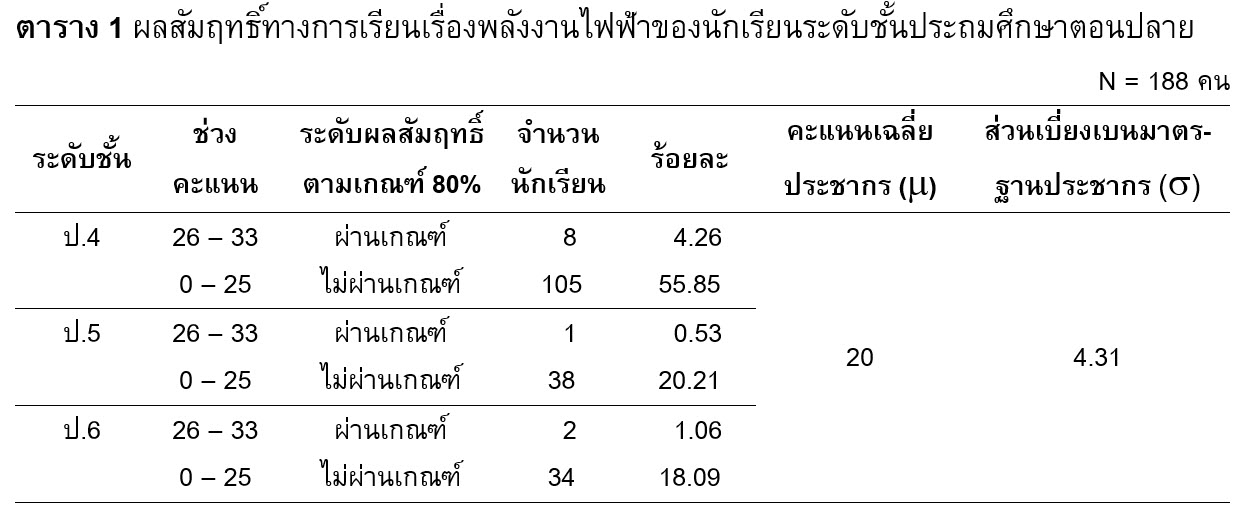ผลสัมฤทธิ์ทางการเรียนและจิตสำนึกในการอนุรักษ์พลังงานไฟฟ้าของนักเรียนระดับประถมศึกษาตอนปลาย
Main Article Content
Abstract
Kritsada Panyawan, Jeerawan Ketsing and Apichart Pattanaporkratana
รับบทความ: 29 พฤษภาคม 2559; ยอมรับตีพิมพ์: 24 สิงหาคม 2559
บทคัดย่อ
งานวิจัยนี้มีวัตถุประสงค์เพื่อศึกษาผลสัมฤทธิ์ทางการเรียนและจิตสำนึกในการอนุรักษ์พลังงานไฟฟ้าของนักเรียนระดับประถมศึกษาตอนปลาย ประชากรเป้าหมายคือนักเรียนชั้นประถมศึกษาปีที่ 4 ถึงปีที่ 6 จำนวน 188 คน จากโรงเรียนสาธิตมหาวิทยาลัยศรีนครินทรวิโรฒ องครักษ์ ซึ่งผู้วิจัยคนที่ 1 ทำหน้าที่เป็นครูประจำการ เก็บรวบรวมข้อมูลจากแบบวัดผลสัมฤทธิ์ทางการเรียนเรื่องพลังงานไฟฟ้าและแบบวัดจิตสำนึกการอนุรักษ์พลังงานไฟฟ้า มีค่าความเชื่อมั่นของแบบวัดผลสัมฤทธิ์ทางการเรียนเท่ากับ .83 และค่าความเชื่อมั่นของแบบวัดจิตสำนึกในส่วนของเจตคติในการอนุรักษ์พลังงานไฟฟ้าเท่ากับ .79 และส่วนของพฤติกรรมเท่ากับ .74 วิเคราะห์ข้อมูลโดยหาคะแนนรายบุคคล ร้อยละ ค่าเฉลี่ย และส่วนเบี่ยงเบนมาตรฐานของประชากร จากนั้นนำคะแนนที่ได้ไปเทียบกับคะแนนมาตรฐานที่กำหนดไว้ ผลการวิจัยพบว่า นักเรียนส่วนใหญ่มีผลสัมฤทธิ์ทางการเรียนต่ำกว่าคะแนนมาตรฐานที่ตั้งไว้ที่ร้อยละ 80 อย่างไรก็ตาม งานวิจัยกลับพบว่านักเรียนส่วนใหญ่มีจิตสำนึกด้านพฤติกรรมการอนุรักษ์พลังงานไฟฟ้าในระดับสูง ขณะที่มีเจตคติในการอนุรักษ์พลังงานไฟฟ้าในระดับปานกลาง ผลการวิจัยที่ได้นี้แตกต่างจากงานวิจัยส่วนใหญ่ที่พบว่าบุคคลมักมีระดับเจตคติในการอนุรักษ์สิ่งแวดล้อมสูงกว่าระดับพฤติกรรมที่แสดงออก งานวิจัยนี้เสนอแนะว่าการปลูกจิตสำนึกในการอนุรักษ์สิ่งแวดล้อมควรเร่งกระทำตั้งแต่ในระดับประถมศึกษา เพราะแม้ว่านักเรียนจะมีความรู้ในเรื่องดังกล่าวไม่สมบูรณ์และมีเจตคติในระดับปานกลาง แต่เด็กในวัยนี้มีแนวโน้มของการแสดงพฤติกรรมที่เป็นมิตรกับสิ่งแวดล้อมในระดับสูง
คำสำคัญ: เจตคติ พฤติกรรม พลังงานไฟฟ้า จิตสำนึกในการอนุรักษ์สิ่งแวดล้อม ผลสัมฤทธิ์ทางการเรียน
Abstract
This study aimed to explore upper elementary students’ learning achievement and their environmental consciousness on electricity conservation. The target population was 188 forth to sixth graders in the Ongkharak Demonstration School Srinakharinwirot University, where the first author was working as an in-service teacher. Data were collected from the electricity achievement test and the environmental consciousness on electricity conservation test. Reliability of the achievement test was .83. The reliability of the environmental consciousness test on an attitude part was .79 and on a behavioral part was .74. The data analysis aimed to find out a total score of each student, population mean score and standard deviations, as well as percentages. The scores were then compared with standard scores and rubrics. Findings showed that most students had learning achievement scores on electricity lower than the standard score (lower than 80%). However, the study found that majority of students presented a high level of electricity conservation behaviors while they showed a moderate level on their attitude toward electricity conservation. The study suggests that environmental consciousness instillation should be emphasized at an elementary level because even though many students had partial understanding of the concept and hold a moderate level in the attitude; they tended to show a high level of environmental friendly behaviors.
Keywords: Attitude, Behavior, Electricity, Environmental consciousness, Learning achievement
Downloads
Article Details

This work is licensed under a Creative Commons Attribution-NonCommercial 4.0 International License.
References
Asawachaiyaporn, P. (2003). The perrception of the importance of indirect energy conservation among Mathayomsuksa-Three students in Bangkok. Master’s Thesis of Social Science (Environment). Nakhon Pathom: Mahidol University. (in Thai)
Boonchan, N. (2008). The Green Globe Award. Issue 3 October 12th - December 2008. (in Thai)
Bureau of Academic Affairs and Educational Standards. (2008). Indicators and Learning the Core Subjects of Science: the Basic Education Core Curriculum B.E. 2551. Bangkok: Agricultural Cooperatives of Thailand. (in Thai)
Department of Natural Resources and Environmental Policy and Planning. (2010). National Strategic Plan on Climate Change 2008 – 2012. Retrived from http://www.onep.go.th/images/stories/file/file2011feb21.pdf, 10 March 2016. (in Thai)
Energy Policy and Planning Office. (2016). Report the Overall Energy Consumption in the First Months of 2016. Retrived from http://doc-eppo.eppo.go.th/EnergySituation/2016_FactSheet/2016_01FS.pdf, 10 April 2016. (in Thai)
Harris, P. G. (2006). Environmental perspectives and behavior in China: Synopsis and bibliography. Environment and Behavior 38(1): 5–21.
House of Representatives. (2009). Meeting Documents of the Energy Commission and the Education Commission of the House of Representatives. Bangkok: (Mimeographed). (in Thai)
INN News Item. (2016). Southern Province 14 Power Outage. Retrived from http://www.innnews.co.th/shownews/show?newscode=454221, 10 March 2016. (in Thai)
International Energy Agency (IEA). (2009). World Energy Outlook 2009 France: Lescure Theol. Retrived from http:// www.worldenergyoutlook.org/weo2009/, January 26, 2010.
Ketsing, J. (2015). Preservice science teachers’ environmental attitudes and behaviors. Kasetsart Journal (Social Science) 36(2): 297–307. (in Thai)
Ketsing, J. (2016). Environmental education course for improving pre-service science teachers’ environmental attitudes and behaviors. Songklanakarin Journal of Social Sciences and Humanities 22(2): 1–39. (in Thai)
Khammani, T. (2010). Pedagogical Knowledge. 12nd ed. Bangkok: Chulalongkorn University. (in Thai)
Maneengam, N. (2004). A Development of a Program to Promote an Energy Saving Mind through Service Learning Concept for Prathomsuksa Six Students. Master’s Thesis of Education (Education and Instruction). Bangkok: Chulalongkorn University. (in Thai)
Ministry of Energy. (2011). 20 Years Energy Conservation Plan ( 2011 – 2031). Bangkok: Ministry of Energy. (in Thai)
Noonsung, K. (2011). Development of Web-Based Instruction to Enhance the Consciousness on Global Warming and Renewable Energy for Mathayomsuksa1 Students. Master’s Thesis of Education (Educational Technology). Bangkok: Kasetsart University. (in Thai)
Office of National Education Standards and Quality Assessment. (2012). A Guide to the Third Round of External Quality Assessment (2011 – 2015 ), School Level (An Amended in November 2011). Samut Prakan: Offset Plus. (in Thai)
Pe’er, S., Goldman, D., and Yavetz, B. (2007). Environmental literacy in teacher training: Attitude, knowledge, and environmental behavior of beginning students. The Journal of Environmental Education 39(1): 45–59.
Pedretti, E. (1996). Learning about science, technology, and society (STS) through an action research project: Co-constructing an issues-based model for STS education. School Science and Mathematics 96(8): 432–440.
Pedretti, E., and Nazir, J. (2011). Currents in STSE education: Mapping a complex field, 40 years on. Science Education 95(4): 601–626.
Prime Minister’s Office. (2011). The Government's Policy Statement. Bangkok: Publisher Cabinet and the Government Gazette. (in Thai)
Saiyod, L., and Saiyod, A. (1997). Statistics for Research. 3rd ed.Bangkok: Suwiriyasarn. (in Thai)
Scott, D., and Willits, F. K. (1994). Environmental attitudes and behavior: A pennsylvania survey. Environment and Behavior 26(2): 239–260.
Sengsook R. (1997). A Study of Mathayomsuksa 1 – 6 Students’ Conception of Energy in Donchimpleepittayacom School, Amphoe Bangnumpeaw, Changwat Chachoengsao. Master’s Thesis of Art in Teaching (Teaching Science). Bangkok: Kasetsart University. (in Thai)
Srisa-ard, B. (2011). Basic Research. 9th ed. Bangkok: Suwiriyasarn. (in Thai)
Suesat, S. (2003). A Study of Behavior of Electricity Power Conservation of Students at Attamit School. Master’s Thesis of Education (Secondary Education Environment). Bangkok: Srinakharinwirot University. (in Thai)
Tanasaksri, P. (2003). A Case Study on the Conditions of the School Building and the Behavior of Teachers and Students on Energy Preservation at Wat Nue Bang Phae School, Primary Education Office, Bangphae District, Ratchaburi Province. Master’s Thesis of Education (Industrial Education). Bangkok: Srinakharinwirot University. (in Thai)
Thapa, B. (1999). Environmentalism: The relation of environment attitudes and environmentally responsibility behaviors among undergraduate students. Bulletin of Science, Technology & Society 19(5): 426–438.
